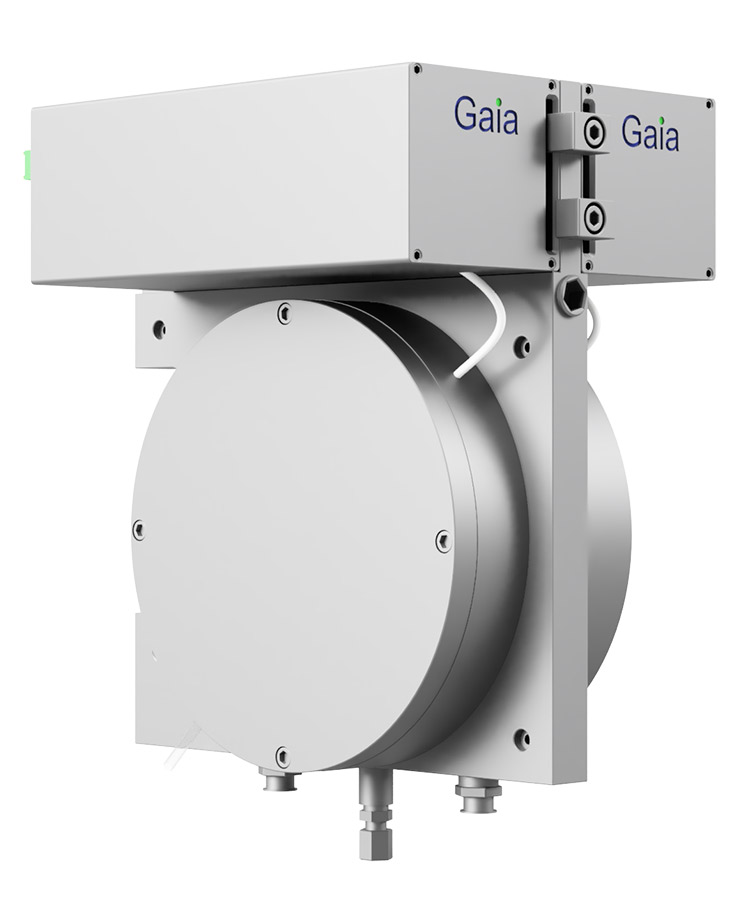Gaia
Ozone
Gaia
Gaia is a compact, modular ozone generator.
Effective and Environmentally Friendly
Ozone is one of the most powerful commercially available oxidants and is commonly used for municipal water and wastewater treatment.
Ozone is an unstable molecule; thus, Water ApS recommends that its generation should occur at the point of application. The length of tubing should be kept as short as possible to minimize ozone destruction within the residence time in the inlet tubing.
If several ozone treatments is needed at the same facility, we recommend that each treatment point should be supplied with ozone from an ozone system build adjacent to the point of treatment. This reduced ozone destruction by transport, and is also a safer option.
Many ozone generators on the market are huge systems, but our modular systems can be used to suit your needs and spread out the ozone production at your facility.
Safety, Effeciency, Stability
Designed to be the first choice for any application
The Gaia ozone generator is designed based on patented technology which makes it stand out from the crowd for its efficiency, reliability, low energy consumption, and outstanding life cycle cost. On top of that, the Gaiaozone ozone generator is user-friendly and easy to operate.
Modular – combine single cells to produce the desired amount of ozone.
Most systems on the market has to be completely shut down during maintanance. Our modular design allows maintainance to be performed – while the system is still running.
Cooling
A very important part of ozone generation is to keep the system cool.
Ensuring a stable low temperature does not only make the ozone generator more effective, the gas inside the generator will also be cooled down, making the ozone more stable for transportation to the point of application.
Larger Gaia modules is cooled down parrallelly with a cooling fluid temperature of maximum 15 °C with a minimum flow of 7 l/m to each generator.
Technical specifications
Ozone output
| WGS | WGD | |
| Gram per hour (g/h) | 62.5 | 125 |
| Concentration (% wt/wt) | 10 | 10 |
| Ozone concentraion (g/Nm3) | 150 | 150 |
Operational conditions
| Oxygen inlet (%) | 93-98 | 93-98 |
| Oxygen dew point (°C) | -60 | -60 |
| Oxygen inlet pressure (bar) | 2-3 | 2-3 |
| Oxygen inlet flow rate (L/min) | 2-10 | 2-10 |
| Oxygen Nm3/hour | 0.12-0.72 | 0.24-1.44 |
| Oxygen Kg/hour | 0.16-1 | 0.33-2 |
| Cooling fluid inlet temperature (°C) | <20 | <20 |
| Cooling fluid flow (l/m, per generator) | 7 | 7 |
| Electricity requirement (V/Hz) | 230 V ±3%, 50/60 Hz, Single Phase | 230 V ±3%, 50/60 Hz, Single Phase |
| Current requirement (A) | 4 | 8 |
| Maximum power consumption (W) | <600 | <1200 |
Physical properties
| Height (mm) | 330 | 330 |
| Width (mm) | 300 | 300 |
| Depth (mm) | 120 | 216 |
| Cooling liquid inlet/outlet (mm) | 10/12 | 10/12 |
| Oxygen inlet (mm) | 4/6 | 4/6 |
| Ozone outlet (mm) | 4/6 | 4/6 |
| Materials | Stainless Steel / Anodized Aluminum / PTFE / PFA / PEEK | Stainless Steel / Anodized Aluminum / PTFE / PFA / PEEK |
| Weight (kg) | 12 | 20 |
| IP class | IP21 | IP21 |
Downloads
Contact Water
Have a question?
Do you have questions about technology, projects, or any other ozone-related topics? Do not hesitate to reach out. We are looking forward to hearing from you!
Contact us
Our terms
Water ApS is part of the OxyGuard International A/S.
OxyGuard International A/S is committed to protecting and respecting your privacy, and we’ll only use your personal information to administer your account and to provide the products and services you requested from us. From time to time, we would like to contact you about our products and services, as well as other content that may be of interest to you.
You may unsubscribe from these communications at any time. For more information on how to unsubscribe, our privacy practices, and how we are committed to protecting and respecting your privacy, please review our Privacy Policy.
By clicking submit below, you consent to allow OxyGuard International A/S to store and process the personal information submitted above to provide you the content requested.
